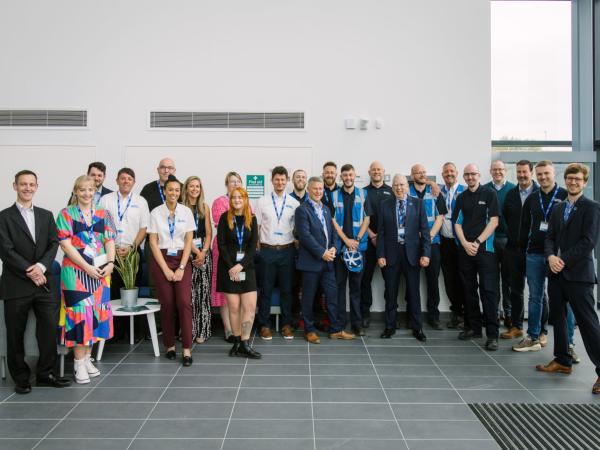
Date: 5 July 2023
Glass Futures, a disruptive research technology organisation, will continue to find solutions for decarbonising energy intensive industries thanks to £7m funding and £11m for its members from the UK government's Department for Energy, Security and Net Zero.
The not-for-profit, which opened its new £54m Global Centre of Excellence in St Helens in June, will be involved in three projects to pave the way for the glass and ceramic industries to drastically cut carbon emissions.
Through investigations into 100 per cent hydrogen, low-cost biofuels and electrical boosting, Glass Futures will partner with its members across the ceramic and glass sectors to drive a smoother, faster transition from fossil fuels.
(1) Rapid and Dynamic Electric Boosting of Glass Furnaces (R&D-Electric):
Electric boosting has been identified by British Glass as having the potential to reduce UK CO2 by 56% annually. Innovation could offer up to 200 MWH load balancing capacity to the UK's electrical grid providing increased energy resilience. This project will model and develop an optimised approach to deploying electric melting by exploring super boosted electric furnaces to hopefully pave the way for 40-50 per cent boost capability for conventional glass furnaces in the future. Thereby, providing a smoother, quicker transition to super-boost hybrid furnaces by 2040.
Glass Futures will install an electric-boost system onto its 30-tonne a day pilot plant in its Centre of Excellence to assess melting efficiency and the impact of convection currents, product quality and seed count (the number of micro-bubbles) within glass. Guardian Glass, a founding of Glass Futures, will run a series of models to understand the most beneficial positioning of electrodes for up to 60 per cent electric-boost. Encirc, another founding member of GLF, is working with us to develop automated techniques and control tools, which are capable of rapidly switching between combustion and electric.
The project will also involve network operators E.ON and National Grid to assess the timescales and costs of upgrading UK grid networks to enable glass plants to transition to electric-hybrid furnaces.
(2) Demonstrating the viability of low-cost biofuels for glass and ceramics:
Building on research carried out by Glass Futures for the UK government (due to be published shortly) that reveals lower cost, renewable, biofuels have the potential to switch UK glass and ceramic sites from natural gas, this project will explore a variety of economically and technology attractive biofuels for a range of industrial glass and ceramic furnace sites. Some of the world's largest glass manufacturers and Glass Futures members O-I, Ardagh and Encirc will trial biofuels on their glass plants. Pilkington UK, part of the NSG Group will also trial biofuels on their float glass plant and DSF refractory manufacturer on their ceramics site with furnace.
The availability, economics and sustainability of low-cost biofuels will be explored as well as compatibility with Carbon Capture, Usage and Storage (CCUS) technologies.
This project will demonstrate fuels that can provide a quick, economical route to decarbonising existing furnaces/kilns as well as a longer-term route to carbon negative industrial manufacturing using CCUS.
(3) Demonstrating Hydrogen in the Ceramics sector:
Following on from an IFS Phase 1 feasibility project which saw Glass Futures fire 100 per cent hydrogen successfully on its combustion test rig, it will work alongside the British Ceramics Consortium including 16 partners across 8 sectors of the ceramics industry (clay brick, clay roof tiles, clay drainage pipes, table/giftware, wall/floor tiles, sanitaryware, refractories and technical/advanced ceramics) to demonstrate 100 per cent hydrogen-firing technologies for the two main types of kiln used across 150+ manufacturing sites.
Most ceramic kilns are fired using fossil fuels, collectively emitting 1.2Mt of CO2 per year, 60 per cent of which comes from the combustion of natural gas to heat kilns. As such hydrogen has the potential to reduce UK emissions by up to 780 kt CO2 per year.
Richard Katz, CEO of Glass Futures, said: "Some ten years after the idea for Glass Futures was conceived it's fantastic to see such progression and the opening of our Global Centre of Excellence this summer. In addition, we have secured over £7m of funding directly and £11m for our members to really put our industrial scale test furnace to use. Without government funding like this much of our ground-breaking research to date wouldn't have been possible.
This new hydrogen project directly addresses the technological gaps we identified in the feasibility stage so we can now fully develop and assess the technical, economic, and environmental feasibility of hydrogen technologies.
Similarly, there is a need to investigate electric boosting and any short-term commercial benefits. The Glass industry operates furnaces that are continually running with long-operation lifetimes, there simply isn't the time or money to trial new fuel technologies that might not work.
This is the exact reason Glass Futures, and our new Centre of Excellence exists - to bring together glass and foundation industries, united by the aim of decarbonisation, with academia to trial innovative, technologies and solutions on an industrial scale."
He added: "And aside from our hydrogen and electric projects, demonstrating the viability of low-cost biofuels will offer solutions to off-cluster manufacturing sites worldwide where the cost of developing the necessary infrastructure to provide low carbon fuels like hydrogen and electricity are likely to be prohibitive but there are large amounts of local bio-derived waste streams in abundance."
 600450
600450








Add new comment